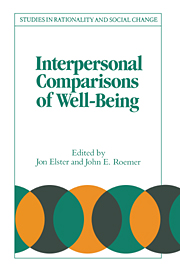Book contents
- Frontmatter
- Contents
- List of contributors
- Acknowledgments
- Introduction
- 1 The moral basis of interpersonal comparisons
- 2 Against the taste model
- 3 Utilitarian metaphysics?
- 4 Local justice and interpersonal comparisons
- 5 Notes on the psychology of utility
- 6 Adult-equivalence scales, interpersonal comparisons of well-being, and applied welfare economics
- 7 Interpersonal comparisons of utility: Why and how they are and should be made
- 8 A reconsideration of the Harsanyi–Sen debate on utilitarianism
- 9 Deducing interpersonal comparisons from local expertise Ignacio
- 10 Subjective interpersonal comparison
- 11 Utilitarian fundamentalism and limited information
- Index
Introduction
Published online by Cambridge University Press: 05 June 2012
- Frontmatter
- Contents
- List of contributors
- Acknowledgments
- Introduction
- 1 The moral basis of interpersonal comparisons
- 2 Against the taste model
- 3 Utilitarian metaphysics?
- 4 Local justice and interpersonal comparisons
- 5 Notes on the psychology of utility
- 6 Adult-equivalence scales, interpersonal comparisons of well-being, and applied welfare economics
- 7 Interpersonal comparisons of utility: Why and how they are and should be made
- 8 A reconsideration of the Harsanyi–Sen debate on utilitarianism
- 9 Deducing interpersonal comparisons from local expertise Ignacio
- 10 Subjective interpersonal comparison
- 11 Utilitarian fundamentalism and limited information
- Index
Summary
In 1987 and 1988 we organized two conferences, one at the University of California (Davis) and one at the University of Chicago, to study the problem of interpersonal comparisons of well-being. We enlisted philosophers, economists, political scientists, and psychologists in the hope that an interdisciplinary approach would help to make some progress on a notoriously intractable issue. The chapters in this book do not yield a complete solution to the problem. We believe, however, that they make us understand better what would count as a solution. Also, they illustrate a number of approaches to the practical task of comparing the well-being – welfare, utility, standard of living – of different people.
We may distinguish among four main problems that arise in this context. First, what do we mean by well-being? Second, is a comparison of the well-being of different people at all meaningful? Third, can such comparisons actually be carried out, precisely or at least approximately, routinely or at least under ideal conditions? Last, how does the purpose for which the comparison is carried out affect the answer to the first three questions? The topic of the chapters in this book is, “How to construct a notion of well-being that is (1) interpersonally comparable, and (2) adequate for purposes of distributive justice.” Whenever the contributors object to a particular concept of wellbeing, it is rarely on the grounds that comparisons of well-being in this sense are devoid of meaning, but rather that the concept itself is inappropriate or that it is inappropriately operationalized, given the normative purposes it is to serve.
- Type
- Chapter
- Information
- Interpersonal Comparisons of Well-Being , pp. 1 - 16Publisher: Cambridge University PressPrint publication year: 1991
- 2
- Cited by



